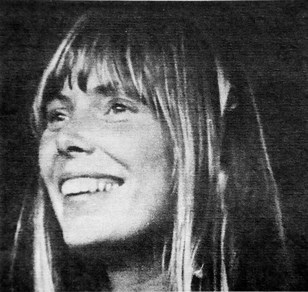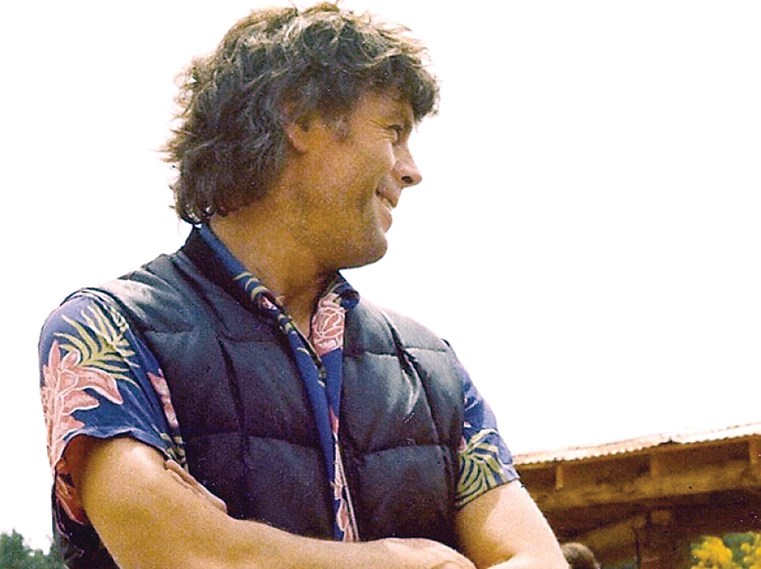A Carpenter’s Tale (Ian Ridgway: A Life) by Ian Ridgway with Jim Brown, Deluxe Gypsy Books, Elphinstone, B.C.
One of the “DeLuxe” crew that established a beachhead for alternative culture on the Maplewood Mudflats in the late 1960s and early 1970s is ready to tell his story.
Ian Ridgway has put it all down on paper in a collaborative effort with his longtime friend, North Vancouver writer Jim Brown.
Born and raised in Hertfordshire, southern England, Ridgway devotes the first chapters of A Carpenter’s Tale to his early life in the U.K. where among other things, he played in a skiffle band with John Baldry, operated the Nucleus Jazz Club and rubbed shoulders with just about everybody who was anybody in swinging London in the ’60s.
Moving to Vancouver in 1965 he hooked up with some old friends and made new ones as he pursued two main interests, music and carpentry, that have continued to be key parts of his life.
Preferring to stay behind the scenes Ridgway found a way to combine the two interests by building sets for many performers over the years (including Joni Mitchell, Tina Turner, Emmylou Harris amd Tommy Chong) as well as working with the likes of Arthur Erickson and Buckminister Fuller on projects.
He also helped Maplewood Mudflats’ neighbour Paul Spong build the OrcaLab, a whale research station that is still in operation off the north coast of Vancouver Island.
As part of the Deluxe crew on the Mudflats, Ridgway had a hand in organizing and building several counterculture Pleasure Faires in the Lower Mainland that combined hippie crafts culture and live music performances.
Some photographs of Joni Mitchell performing at the Dewdney Trunk Road Pleasure Faire/Craftsman’s Market in September, 1971, are included in the book.
The DeLuxers designed “the best stage we ever built” for Paradise Bowl on Grouse Mountain, based on a Haida lodge house.
Ridgway eventually moved his family to the Sunshine Coast where he has been a “pony-tailed jack-of-all-trades” for several decades working on projects both big and small.
North Shore News: A Carpenter’s Tale is a great read, full of fascinating history. Every B.C. library, particularly here on the North Shore should have a copy of your book. What triggered you to write it all down at this time?
Ian Ridgway: I’m constantly working on jobs with these young lads and something will remind me of one of our previous efforts and so I start telling these stories to the boys. Over the years they’ve been saying you should write this down while you can still remember it all and that’s what really got me going. My collaborator is an old friend and he’s written a bunch of books. I just talked and he recorded it all. We started editing from there. It was fun going back over the old memories and eventually finding photographs and trying to connect them to the times.
North Shore News: How long have you known Jim Brown?
Ian Ridgway: He organized a thing called A Book in a Bag – there’s a chapter in the book about it. After the Mission Faire we brought him images which he put together in this book. They were just loose pages of photographs in a batik bag. There was a lot of great images some of which are in my book. I met Jim back in the early ’60s when we were hanging around Kitsilano. We were just at a lot of events and things together. We played music together as do most of me and my friends.
North Shore News: There’s quite a few voices that carry the narrative in A Carpenter’s Tale. Jim and you and your daughter Galen.
Ian Ridgway: Yes, and also some of the old gang: Davey Longworth, Dan Clemens, and Chris Oakes. All these people that we’ve worked with over the years and kept in touch with. Jim did interviews over the phone and pieced it all together.
North Shore News: Why did you decide to move to Canada in the ’60s?
Ian Ridgway: There was all kinds of music and stuff happening in the coffee bars in England. Skiffle music was going on and I was involved with that, too. We already knew a bunch of Canadians. There was a scene in the West End of London, a loft with a whole bunch of studios, where there were Canadian guys so we got to know them and heard about things over here. My family was growing and somebody said, ‘You should go to Vancouver, you’ll love it. Don’t worry about the east just fly by all that and fly right to Vancouver.’ That’s exactly what we did and I’m still in touch with some of those people such as the artist Donna Balma. I already had a few friends here that we knew through London and the arts scene and I soon became involved with building things for artists and putting on events with Intermedia and then the DeLuxe Brother thing which turned out to be a lot of fun.
North Shore News: Did you live in one of the houses at the Mudflats in North Vancouver?
Ian Ridgway: I had my gypsy wagon there at various times. When we started hanging out there there were these three old guys and there was a bunch of shacks and things that nobody was really living in. They invited Peter Choquette to move in and he did. His shed kind of floated up and he just propped it up and moved in and then the other sheds we just gradually took over a few of them. We did build one little place called The Boys House that some characters moved into.
North Shore News: How did DeLuxe become involved in producing the Pleasure Faires?
Ian Ridgway: Dan and I, before we really met, had gone to the Sky River Rock Festival down in Washington and it just completely blew us away watching all these incredible bands play on this very simple stage. When we finally got around to it we called ours a craft fair. We were puting on a craft show and we didn’t even use the word ‘pleasure’ until the final posters were out and we’d gone through the whole approval process. They came in with this thing called the Special Events Bylaw which you had to get past the fire department, police, food, everybody had to approve of your plans so we kept it on the down low (in the planning stages).

North Shore News: You were already using the Mudflats as a base?
Ian Ridgway: We were all living there, Dan and I and Helen and a few other people, and that’s where Helen said, ‘Well when are you guys going to get this together?’ We finally started planning and got this land out in Langley and put a fair on and we did several others after that.
North Shore News: Mission sounds like it was an epic adventure.
Ian Ridgway: That was a beautiful thing. Through Al Clapp at Channel 8 TV we got hold of the penitentiary property out in Mission with nine lots and all these barns and houses. They gave us permission to put on a fair there. We had a lot of raw material to play with and spent the whole summer out there putting this thing together and it was a hell of a good time. We put a few shows on during Labour Day weekends. What happens is it always rains on the Saturday, on the Sunday you’re not sure and then on the Monday the clouds part the sun comes out and everybody comes out and you’re surprised. That’s what happened there. None of these things were a commercial success even the Grouse Mountain shows were more a cultural event. Somebody along the line said, ‘We can do this, we can make some money here.’
We were planning to do one at the PNE and turn the Demolition Derby site into a proper built-in Disneyland pleasure faire thing but the Rolling Stones put a stop to that. They freaked out when the riot happened (in June 1972) so we didn’t get to do it. We still liked to stick our nose in when necessary.
North Shore News: What was it like buildng the McCabe and Mrs. Miller set in West Vancouver?
Ian Ridgway: What happened was Robert Altman’s set designer came down to the Mudflats and looked around and said, ‘Ah yea, I like this – this is going to be our Chinatown’ and so a few of us got work up there.
North Shore News: Did John Baldry move to Vancouver because of his friendship with you?
Ian Ridgway: I’m not sure why he came here but he just liked it out here. I went to see him a before he did move here and met him backstage and we talked about the old days. He eventually moved to this great apartment on fourth where he had the whole upper floor.
North Shore News: You built the stages but did you play in many bands as well?
Ian Ridgway: Not really. I was always an amateur. We played around the campfire and in the wagons and events and things but there were always the name bands around. It wasn’t until I came up here (to the Sunshine Coast) and started playing with a bunch of guys that we formed a band that we called the Living Room Legends. From about 60 to 70 I did that. Now I just play at home with a loop station and everybody that drops by. If we have a party we set up a studio thing. It’s pretty laidback.
Further reading:
Squatters recycled utopian dreams
Knee deep in the Mudflats: Q & A with photographer Bruce Stewart
DeLuxe utopian vision: Q & A with Davy Joel Rippner
Boot and fog: Robert Altman kept his distance from Old Hollywood
Dollarton days: Malcolm Lowry made himself at home on the waterfront



